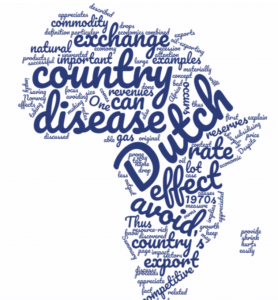Dutch Disease
Dutch Disease (DD) in economics is a phenomenon that was first described in the Netherlands in the 1970s. It occurs when a country’s exchange rate appreciates as a consequence of exporting natural resources. On this page, we discuss the Dutch disease effect, provide some Dutch disease examples, and explain how a country can avoid it.
Dutch Disease definition
The Dutch Disease occurs when a country has a lot of natural resources. In that case, the country that owns the resources exports these to other countries. This causes the exchange rate of the country to appreciate. While this in itself is not bad, it has some unwanted effects. In particular, the appreciating exchange rate implies that the other products of the country also become more expensive and harder to export. Thus, DD hurts the other sectors of the economy.
A related effect of the DD is the fact that the country will allocate a lot of the country’s resources to the extraction of the raw resources. Thus, the other industries are being neglected and thus may shrink in size.
Both effects combined imply that the country becomes increasingly dependent on the revenues from exporting the resources. When the price of the commodity drops, the country can easily go into a recession as tax revenues and output drop sharply.
Dutch disease examples
The original name for the Dutch Disease effect comes from the Netherlands. In the 1970s, gas reserves were discovered in the Netherlands. With the export natural gas, the Dutch exchange rate appreciated, making other industries less competitive. Other countries that are prone to the disease are oil-exporting countries and resource-rich countries in Africa.
How to avoid Dutch disease?
How to avoid it? One way countries avoid Dutch disease is by saving the proceeds of the export of the resources and to focus attention on the country’s other industries. This can be done by subsidising these industries or taking measures to keep them competitive. One country that has been successful in avoiding the DD is Norway. Despite the large oil reserves, the country has been able to avoid other sectors from being harmed by an appreciating currency.
Summary
We discussed the Dutch disease, an important concept in the context of exchange rates. It is important to know this effect, because it can materially impact a country’s economic growth.

